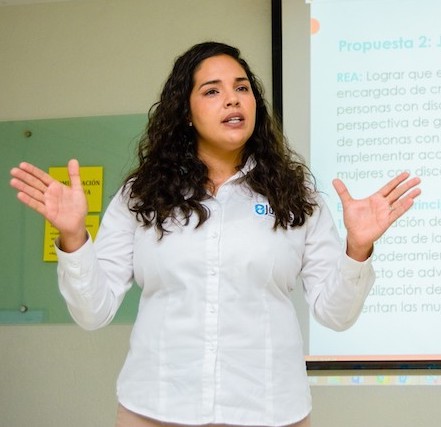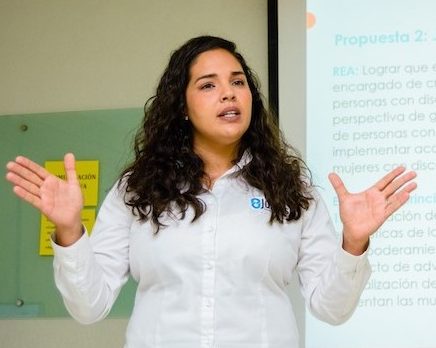By Alejandra García Muñiz, Rise Up Gender Equity Initiative Fellow and Sustainability Director of Juntos, Una Experiencia Compartida (Together, A Joint Experience)
Continuing our series of profiles of new Rise Up Gender Equity Initiative Fellows, Alejandra García Muñiz shares her experience of gaining new skills and knowledge through Rise Up’s Advocacy and Leadership Accelerator in Mexico.

Alejandra García Muñiz, Rise Up Gender Equity Initiative Fellow and Sustainability Director of Juntos, Una Experiencia Compartida
Before Rise Up’s Leadership and Advocacy Accelerator, Juntos focused our efforts on improving the quality of life for people with disabilities through work placement programs, job training, and personal development initiatives.
At the time we didn’t realize that our work was considered advocacy. Rise Up widened our perspective and thanks to the training we received, we are now advocating in a more strategic and organized way so that our programs go beyond service delivery to impact public policy. As a result, we are able to increase the social impact of our organization and benefit larger segments of the population with disabilities, specifically girls, adolescents, and women.
I feel inspired to work with this population because women and youth with disabilities are treated as invisible, their voices are not heard and, in some cases, they don’t even realize they have a voice. I feel inspired to be the bridge that connects them, to help them raise their voices so that they can live without violence and improve their quality of life.
I applied to the Rise Up program because it is important that civil society leaders like myself continue to improve ourselves and learn from each other. When Rise Up accepted me I was excited to meet people from different contexts, with different knowledge and experiences and learn from them and share with them.
I learned the significance of a structured methodology for my organization, one that ignites structural and political changes, so that we can have an exponential social impact to benefit women and young people with disabilities. This methodology has changed our strategy and now we have developed good relationships with decision makers and politicians in our state and are making strong alliances, so we can work in collaboration.
Currently, we are working to incorporate a gender perspective throughout the Law on the Inclusion of Persons with Disabilities in the state of San Luis Potosí. Changes to this law will ensure that all women living with disabilities in the state have access to services and opportunities specifically designed with their needs in mind. For example, besides ensuring that people with disabilities have job opportunities, it can guarantee that mothers with disabilities have access to childcare services. To achieve this we will train women with disabilities on advocacy so they can directly engage with decision makers to advocate for specific affirmative actions and programs to benefit women with disabilities. Incorporating a gender lens in the law will answer questions like: “Have women been considered? If not, how might that omission be corrected?”
My hope for the future is for more empowered and independent women with disabilities to participate in society, occupy positions at all levels in public and private institutions and companies, and determine their own relationships and futures with autonomy.
I will know we have been successful when women, girls, and youth with disabilities have a voice and are not only taken into consideration in decision-making spaces, but also are able to take ownership of decision-making processes that affect their lives.


